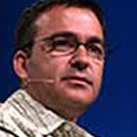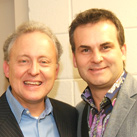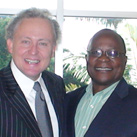The Priorities Of The 21st Century Normal Church: Acts Series #10
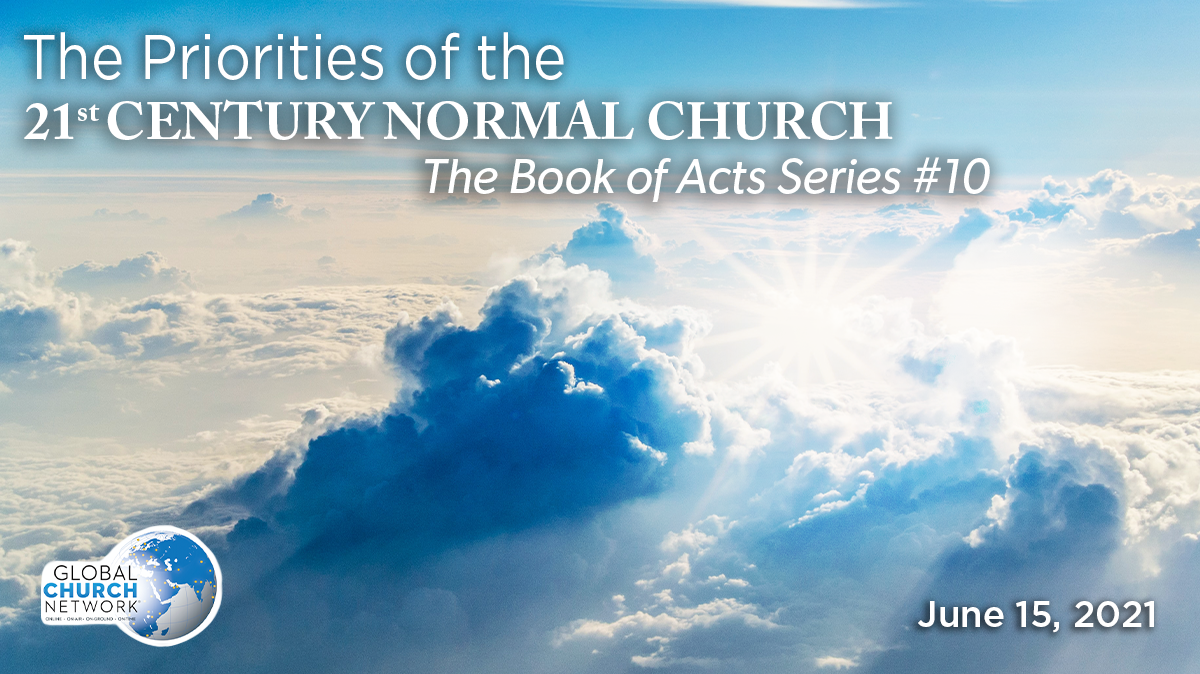
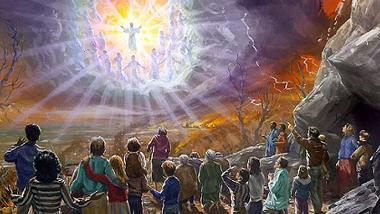 On the Day of Pentecost, three major things happened. First, there was the sending of the Spirit. The Spirit of the Lord came into the house of the meeting and into the hearts of members. The promised had been possessed!
On the Day of Pentecost, three major things happened. First, there was the sending of the Spirit. The Spirit of the Lord came into the house of the meeting and into the hearts of members. The promised had been possessed!
Second, there was the sermonizing of the saint. Peter was changed. At one time, Peter denied Christ; but now he defended Christ. His sermon preached Jesus to the Jews and propagated the Gospel to the Gentiles. The preacher was powerful!
Third, there was the saving of the sinners. The Church became a crusade. It evangelized sinners and edified the saints. Three thousand people were saved on the Day of Pentecost. What a day that must have been! The people were pardoned!
As days transpired, the infant church became an invincible church. It preached the Scriptures with power and ministered to the sick with miracles. Our text gives us a biblical backdrop of what we should practice and preach today. We must stand on the Scriptures and be sold out to the Savior. I would like to suggest that there are ten qualities or priorities of the 21st Century normal church. These priorities are often forgotten or neglected; but, they are the bedrock to building or rebuilding a dynamic soul-saving, discipling church.
We Need To Be Steadfast In The Scriptures (2:42a)
 We read, “And they continued steadfastly in the Apostles’ doctrine.” We have the motivation (“continued”) and the mentality (“steadfastly”). It is one thing to begin in the right direction but what does it matter if the journey is not finished. Many Christian leaders begin but they simply quit too soon. A runner can be leading a race, but he/she quits too soon, he/she will come in last place.
We read, “And they continued steadfastly in the Apostles’ doctrine.” We have the motivation (“continued”) and the mentality (“steadfastly”). It is one thing to begin in the right direction but what does it matter if the journey is not finished. Many Christian leaders begin but they simply quit too soon. A runner can be leading a race, but he/she quits too soon, he/she will come in last place.
The late Dr. Bill Bright, the Founder of Campus Crusade for Christ said, “We have enough methods, models, money, and men; we just need enough motivation to finish the Great Commission.” The lack of motivation is the result of dreams not becoming destinies and valleys becoming victories. The world, both past, and present are filled with people who had a grand idea or God-sized vision, but they never saw the light of day because the person was unmotivated.
Additionally, to their motivation, they had the right mentality. The Scriptures inspired their motivation and instructed their mentality. It takes two wings to fly. The early church had motivation and mentality. We are going in the direction of our most dominating thought. As a person thinks, so he or she will become over time. If we are going to build a rock-solid house, we will have to dig deep until we find solid rock: this is the difference between building a house on the rock and one on the sand.
We Need To Be Steady In Sociability (v. 42b)
 We read, “and in fellowship.” The New Testament does not teach lone ranger Christianity. We are not do life alone in general and Christianity in particular. Make a list of the closest friends in your life, it is a picture of your life five years from now.
We read, “and in fellowship.” The New Testament does not teach lone ranger Christianity. We are not do life alone in general and Christianity in particular. Make a list of the closest friends in your life, it is a picture of your life five years from now.
What is meant is that these three thousand, being cut off altogether from their ancient associations, finding themselves at once separated by a great gulf from their nation and its hopes and its religion, were driven together as sheep are when wolves are prowling around them. They held on to one another so that many of their weaknesses might become a strength, and glimmering embers raked together might break into a flame.
Today, all these circumstances, that drove these early believers together, are at an end, and the tendencies are rather to drive Christian people apart than to draw them together. Differences of position, occupation, culture, ways of looking at things, views of Christian truth, and the like, all come powerfully into the reinforcement of the natural selfishness which tempts us all unless the grace of God overcomes it. Although we do not want any extreme Christian sympathy and brotherhood, we do need-far a deeper understanding for the health of our own souls more definite efforts to cultivate greater Christian brotherhood with all that hold the same Lord Jesus Christ. We desperately need to realize that we are nearer to one another in Christ, than are we to those nearest to us who do not share in our Christian faith.
But if any Christian person will honestly try to cultivate the brotherly or sisterly feeling which our text suggests, and to which our common relation to Jesus Christ binds us, and will try it in reference to whom he or she does not much like, with whose ways he or she has no kind of sympathy, whom he or she believes to be a heretic, he or she will find it is a pretty sharp test of his Christian principle. Let us be real, at any rate, and not pretend to have more love than we really have in our hearts.
We Need To Be Stable In Sacraments (v. 42c)
 We read, “and in breaking of bread.”
We read, “and in breaking of bread.”
There have been many debates as to whether this means eating ordinary meals or partaking of the Lord’s Supper. I venture to say it means both, because, clearly enough, in the beginning, the common meal was hallowed by what we now call the Lord’s Supper being associated with it.
The gradual growth of the sentiment attaching to the Lord’s Supper, until it reached the portentous height of regarding it as a tremendous sacrifice which could only be administered by priests with ordained hands in Apostolic succession, can be partly traced even in New Testament times. The Lord’s Supper began as an addition to each evening meal. Then, before the epoch of the Acts of the Apostles is ended, we find it has become a weekly celebration and forms part of the service on the first day of the week.
These first believers hallowed common things by doing them, and common food by partaking of it, with the memory of His great sacrifice in their minds. The poorest fare, the coarsest bread, the sourest wine, on the humblest table, became a memorial of the Lord. Religion and life, the domestic and the devout, were so closely braided together that when a household sat at the table it was both a family and a church. While they were eating their meat for the strength of their body, they were partaking of the memorial of their dying Lord.
We Need To Be Strong In Supplication (v. 42d)
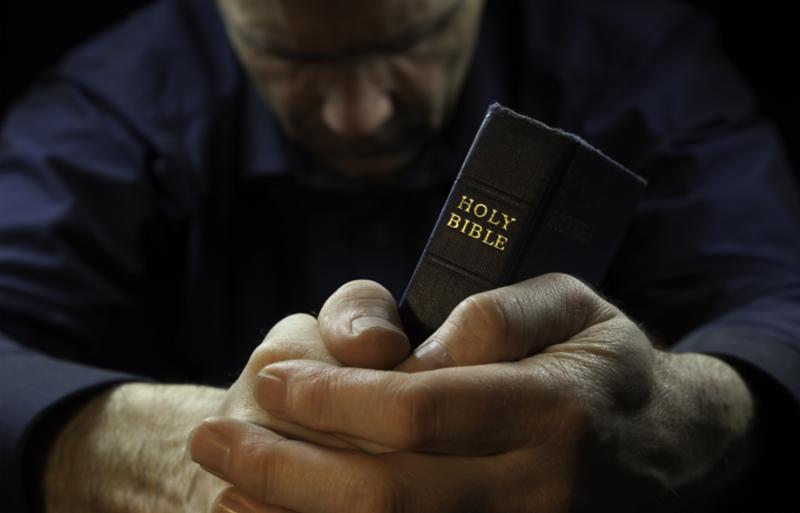 We read, “and in prayers.”
We read, “and in prayers.”
I suppose at that time, the disciples did not have specific forms of Christian prayers. They still used the Jewish liturgy, for we read that “they continued daily with one accord in the Temple.” I am sure that no two things can be less like one another than the worship of the early Church and the worship of our contemporary congregations.
Did you ever try to paint for yourselves, for instance, the scene described in the First Epistle to the Corinthians? When they came together in their meetings for worship, “everyone had a psalm, a doctrine, an interpretation.” Let the prophets speak, by ones, or at most by twos’; and if another gets up to interrupt, let the first speaker sit down.”
Paul goes on to say, ‘Let all things be done decently and in order.’ So, there must have been tendencies to have disorder.
Many times, wise leaders are in no haste to change forms. Usually, forms change themselves when their users change. But it would be a good day for Christendom if the faith and devoutness of a community of Believers, for instance, were so strong in the Spirit, that instead of the pastor/preacher continually speaking, everyone had a psalm or a doctrine, and were able to speak out of the fulness of the Spirit which God poured into them. It will come someday; it must come if Christianity is not to die of its own dignity. However, we do not need to hurry matters, only let us remember that unless the Church continues steadfast in prayer it is worth very little.
They continued steadfastly in the Apostles’ teaching, no doubt; but also “steadfastly in prayer.” I pray that you will try to imagine this picture of the Pentecostal converts and do your best to help forward the time when it shall be the reality in your church, and in every other community of professing Christians.
We Need To See The Supernatural (v. 43)
 With the outpouring of the Holy Spirit, there were many miracles, wonders and signs. The attitude of the members is found in “and fear came upon every soul.” The amount of the miracles is recorded with, “and many wonders and signs.” The accomplishment of the ministers is “done by the Apostles.”
With the outpouring of the Holy Spirit, there were many miracles, wonders and signs. The attitude of the members is found in “and fear came upon every soul.” The amount of the miracles is recorded with, “and many wonders and signs.” The accomplishment of the ministers is “done by the Apostles.”
Throughout the Bible, God has granted His messengers the ability to perform miracles in order to validate that their message is from Him. The point of ministry is never the miracle itself, but the message (Mark 1:36-38)
The disciples have performed miracles before, and they know what comes after. Early on, Jesus sent them out to heal, cast out demons, and exhort people to repent of their sins (Mark 6:7–13). They had seen what happened to Jesus when He performed miracles: He was mobbed (Mark 4:1). They got a taste of this, too—when Jesus took them on a boat to find some time away and the people saw them leave and raced so hard a crowd had formed before they landed (Mark 6:30–34).
However, they have received the Holy Spirit who gives them power (Acts 1:8) but also wisdom (John 14:26). And that same Holy Spirit is working in the hearts of the people the apostles meet. The word, “Wonder,” is from the Greek root word teras. It is a miracle that reveals a hidden truth, like how the transfiguration revealed Jesus’ glory and deity (Mark 9:2–13). The term for, “Signs,” is from the Greek root word semeion. The sign is that the person who performs the miracles is special and chosen by God. A good example is when Paul suffers no ill effect after being bitten by a viper. At first, the local people think he is being cursed by the gods for a terrible offense. When he lives, they still assume he has a divine connection, but still misinterpret it, at first (Acts 28:1–6).
I am still amazed as to why the North American Church has bought into the seeker-sensitive philosophy. The supernatural does push people away from church but pulls them closer to Christ and His Church. In the New Testament, every miracle had a message and the supernatural had a sign. For decades now, we have had believed we know better than the patterns and principles left behind for us in Scripture.
We Need To Be Willing To Sell Our Subsistence (v. 44-45)
 The Scriptures are not teaching communism or socialism. We should understand the stairsteps to victory.
The Scriptures are not teaching communism or socialism. We should understand the stairsteps to victory.
We note first, the believer’s location (“All the believers were together” v.44a).
“All the believers” – That is, that believed that Jesus was the Messiah; for that was the distinguishing point by which they were known from others. “Were together” – Were united; were joined in the same thing. It does not mean that they lived in the same house, but they were united in the same community, or engaged in the same thing. They were doubtless often together in the same place for prayer and praise. One of the best means for strengthening the faith of young converts is for them often to meet together for prayer, conversation, and praise.
We now see the believer’s limitation (“and had all things common” v.44b).
“Had all things common” – That is, all their property or possessions. See Acts 4:32-37; Acts 5:1-10. The Apostles, in the time of the Savior, evidently had all their property in common stock, and Judas was made their treasurer. They regarded themselves as one family, having common needs, and there was no use or propriety in their possessing extensive property by themselves. Yet even then it is probable that some of them retained an interest in their property which was not supposed to be necessary to be devoted to the common use.
It is evident that John thus possessed property which he retained, John 19:27. And it is clear that the Savior did not command them to give up their property into a common stock, nor did the Apostles enjoin it: Acts 5:4, “While it remained, was it not thine own? and after it was sold was it not in thine own power?” It was, therefore, perfectly voluntary, and was as evidently adapted to the special circumstances of the early converts.
Many of them came from abroad. They were from Parthia, and Media, and Arabia, and Rome, and Africa, etc. It is probable, also, that they now remained longer in Jerusalem than they had at first proposed; and it is not at all improbable that they would be denied now the usual hospitalities of the Jews, and excluded from their customary kindness, because they had embraced Jesus of Nazareth, who had been just put to death. In these circumstances, it was natural and proper that they should share their property while they remained together. Additionally, we see the believer’s love with (“and sold their possessions and goods” v.45a).
They sold their valuable possessions and parted the price of them to all men — That is, to their brethren; as every man had need — Not that this was intended for an example, or to be a constant and binding rule to all Christians, in all places and ages; as if they were bound to sell all their property, and give the money arising from the sale in charity.
For St. Paul, in his Epistles, after this, often speaks of the rich and poor, as distinguished from each other; and Christ said, “The poor you have always with you;” evidently meaning that this always would, more or less, be the case among his followers.
Indeed, the New Testament abounds with passages which plainly show that what now took place at Jerusalem, was not intended to be a general practice in the church of Christ. For they who believed Christ to be a divinely-commissioned teacher, must believe that the Jewish nation would shortly be destroyed, and an end put to the possession of goods and estates by the Jews in Judea; and in the belief of that, the converted Jews resident in the country wisely sold theirs for the present service of Christ and his church, before they were snatched from them by the enemy. It does not appear, however, that the apostles enjoined this upon any of them, as an absolute duty; for Peter tells Ananias, that the possession he had sold was his own property before he had sold it, and that, after he had disposed of it, the price he had received for it was still in his own power, to have given, or not given, the whole or any part of it (Acts 5:4).
Last, we understand the believer’s liberality (“and parted them to all men, as every man had need.” v.45b-c).
If we can learn to sow deep into people, we will also meet the needs of the width of people. As I have traveled from church to church, I have come to learn that it is not necessarily the large church, that understand liberal giving. Often, it this small church sows the large offering into their visiting evangelist. Our Lord will not be able to get a God-sized vision into the small-minded church or person. Our giving reflects the size of our spirit and the scope of our future.
We Need To Be Supportive Of Solidarity (v. 46a-b)
 In Acts 2:46, we find the house of prayer and the homes of people. As to the house of prayer, we read, “and they continuing daily with one accord in the temple.” As to the homes of people we read, “and breaking bread from house to house.”
In Acts 2:46, we find the house of prayer and the homes of people. As to the house of prayer, we read, “and they continuing daily with one accord in the temple.” As to the homes of people we read, “and breaking bread from house to house.”
At first it would have seemed natural that the followers of a Teacher whom the priests had condemned to death, who had once nearly been stoned, and once all but seized in the very courts of the Temple, should keep aloof from the sanctuary that had thus been desecrated. But they remembered that He had claimed it as His Father’s house, that His zeal for that house had been as a consuming passion (John 2:16-17). Therefore, they had attended its worship daily before the Day of Pentecost (Luke 24:53); and even more so since they have come to know Christ.
The apparent strangeness of them being allowed to meet in the Temple is explained partly by the fact that its courts were open to all Israelites who did not disturb its peace, partly by the existence of a moderate half-believing party in the Sanhedrin itself, including Nicodemus, Joseph of Arimathæa, and Gamaliel (Acts 5:35); and by the popularity gained for a time by the holiness and liberal almsgiving of the new community.
The “breaking bread from house to house”—They met in the Temple, they met also in what, in the modern sense of the word, would be the “church” of the new Christian community, for the act of worship, and of fellowship, for which the Temple was, of course, unsuitable.
We Need Singleness of Soul (v. 46c-d)
 They had provision, purpose and praise. With provision, we see “did eat their meat with gladness;” with purpose we read, “singleness of heart;” and with praise we see “praising God.”
They had provision, purpose and praise. With provision, we see “did eat their meat with gladness;” with purpose we read, “singleness of heart;” and with praise we see “praising God.”
With the words, “Did eat their meat . . .” we see the demonstration of a customary act. The words imply that as yet the solemn breaking of bread was closely connected with their daily life. The higher sanctified the lower. It was not till love and faith were colder that men were forced to separate them, lest the lower should desecrate the higher.
Notice carefully, “Gladness and singleness of heart”—This “gladness” is significant. The word was the same as that which had been used by the angel to Zacharias (Luke 1:44) in announcing the birth of the Forerunner. The verb from which the noun was derived had been employed by our Lord when He encouraged His disciples to rejoice and be glad (Matthew 5:12). The literal meaning of the word translated “singleness,” which does not occur elsewhere in the New Testament, was the smoothness of a soil without stones. Thus, it came to be used for evenness and simplicity, unity of character; unity showing itself in love.
Today, the Church needs provision, purpose and praise. We need an “open heaven” above us, where the Lord pours out His provision; we need an “open heart” within us, where the Lord pours in divine purpose; we “open hands” before us, where we lift them in praise to the Lord!
We Need To Show Our Salvation (v. 47a)
 The early Church had this testimony: “have favor with all the people.” The new life of the Apostles, in part probably their liberal almsgiving, had revived the early popularity of their Master with the common people. The Sadducean priests were, probably, the only section that looked on them with a malignant fear.
The early Church had this testimony: “have favor with all the people.” The new life of the Apostles, in part probably their liberal almsgiving, had revived the early popularity of their Master with the common people. The Sadducean priests were, probably, the only section that looked on them with a malignant fear.
When favor is high, labor is low. When favor is low, labor is high. I believe the favor of God should rest upon our lives. When we enter into a room, the room should get a little bit brighter. When we leave the presence of a person, he or she should feel refreshed and not worn out. When a company is looking for new workers, the HR department should say, “Look for Christians first. They are the best workers and most honest people we can ever have in this company.”
If there is one thing among many things the Church needs in the modern world, is favor. We need favor in the marketplace, the political world and in the neighborhood. We need a root, shoot and fruit in our Christian life. Our root is to go down deep, our shoot is to stand tall, and our fruit is to blossom big and bright in this dark, dismal world. The early Church had the favor of the Lord upon and had favor in the eyes of the common people. Do you have the favor of the Lord upon your life?
We Need To Be Successful In Soul-Winning (v. 47b)
 Look at the results of the early Church. We read, “And the Lord added to the church daily such as should be saved.” What a testimony! We read, “The Lord added to the church daily such as should be saved.” The Lord added together . . . The verb “added” is in the tense which, like the adverb “daily,” implies a continually recurring act. “The Lord” is probably used here, as in Acts 2:29, in its generic Old Testament sense, rather than as definitely applied to Christ. For “such as should be saved”—a meaning which the present participle passive cannot possibly mean; it literally means, those that were being saved, as in 1Cournthins 1:18; 2Corthians 2:15.
Look at the results of the early Church. We read, “And the Lord added to the church daily such as should be saved.” What a testimony! We read, “The Lord added to the church daily such as should be saved.” The Lord added together . . . The verb “added” is in the tense which, like the adverb “daily,” implies a continually recurring act. “The Lord” is probably used here, as in Acts 2:29, in its generic Old Testament sense, rather than as definitely applied to Christ. For “such as should be saved”—a meaning which the present participle passive cannot possibly mean; it literally means, those that were being saved, as in 1Cournthins 1:18; 2Corthians 2:15.
I believe that modern Christianity has far too much lost the vivid impression of this present Christ as actually dwelling and working among us. What is good in us and what is bad in us conspire to make us think more of the past work of an ascended Christ than of the present work of an indwelling Christ.
We cannot think too much of that Cross by which He has laid the foundation for the salvation and reconciliation of all the world; but we may easily think too exclusively of it, and so fix our thoughts upon that work which He completed when on Calvary. Even though He said, ‘It is finished!,” upon the cross, we never forget the continual work which will never be finished until His Church is perfected, and the world is redeemed.
If we are a Church of Christ at all, we have Christ among us, and working through us. And unless we have, in no mystical and unreal and metaphorical sense, but in the simplest and yet grandest reality, that living Savior is in our hearts and in our fellowship, better that our church walls were levelled with the ground, and our congregations scattered to the four winds of heaven. The present Christ is the life of His Church!
Notice, He adds to the Church, not we, not our preaching, not our eloquence, our fervor, our efforts. These may be the weapons in His hands, but the hand that wields the weapon gives it all its power to wound and to heal, and it is Christ Himself who, by His present power, is here represented as being the Agent of all the good that is done by any Christian community, and the Builder-up of His Churches, in numbers and in power.
It is His will for, His ideal of, a Christian Church, that continuously should be gathering into its fellowship those that are being saved. This is establishment of His Church upon earth, and that is His will concerning it and concerning us, and the question should press on every society of Christians: Does our reality correspond to Christ’s ideal? Are we, as a portion of His great heritage, being continually replenished by souls that come to tell what God has done for them? Is there an unbroken flow of people into what we call our communion?
I write this to you, as members of His Church, and I ask you to ponder the questions: Is it so? If it is not so, “What should we do? ‘The Lord added daily,’- why does not the Lord add daily to us?
Back To Blog
